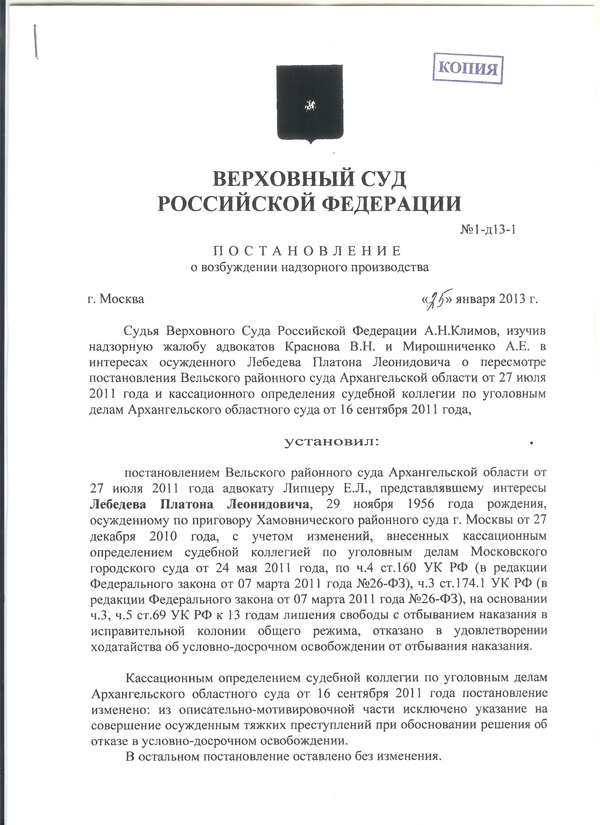Lebedev’s Parole Application Back in Play
In response to an application from Platon Lebedev’s defence team, Russia’s Supreme Court has ordered the Arkhangelsk Regional Court to review a September 2011 decision refusing Lebedev’s release on parole. After nearly a year-and-a-half wait for this two-and-a-half-page Supreme Court decision, a hearing on Lebedev’s parole application has been scheduled in Arkhangelsk Regional Court on March 20, 2013.
Lebedev’s defence team received a copy (see at the end of the post) of the Russian Supreme Court’s order, dated January 25, 2013, only on February 13, 2013.
Lebedev had argued that it was unconstitutional for him to be denied parole for not admitting guilt or paying compensation.
Commenting on this development that puts Lebedev’s parole application back in play, lawyer Vladimir Krasnov stated the following:
“The order [of the Supreme Court] to review Lebedev’s parole case in itself means that decisions handed down earlier are illegal. We have a lot to say to the Arkhangelsk Regional Court Presidium in this regard. I will be visiting Platon Leonidovich [Lebedev] on February 18 and we will discuss our position and will be getting ready for yet another fight.”
Both Lebedev and Khodorkovsky are eligible for release on parole under Russian law and standard practice.
Khodorkovsky’s last application for release on parole dates to 2011. Following years of repeated judicial hijinks and unfair reprimands in prison to thwart his release, he has not since reapplied.
In separate proceedings – in which Khodorkovsky and Lebedev were appealing against the December 2010 verdict in their second trial – in December 2012 the Moscow City Court reaffirmed its overall finding of guilt but shifted the scheduled release of the two men from 2016 to 2014.
Additionally, also in separate proceedings, after failing to obtain release on parole in 2011, in 2012 Lebedev attempted to avail himself of recently-reformed sentencing rules under which he could qualify for a reduced sentence irrespective of his parole application. Last year, Lebedev twice succeeded in obtaining a court order for early release in 2013, pursuant to the sentencing reforms. Yet – in what became a game of judicial ping-pong – on each occasion prosecutors successfully appealed against Lebedev’s early release, until the proceedings were finally short-circuited by the Moscow City Court’s December 2012 ruling.
Khodorkovsky had been watching Lebedev’s early-release proceedings closely but has not to date filed an application for a reduced sentence.
A scanned copy of the Russian Supreme Court’s order:






